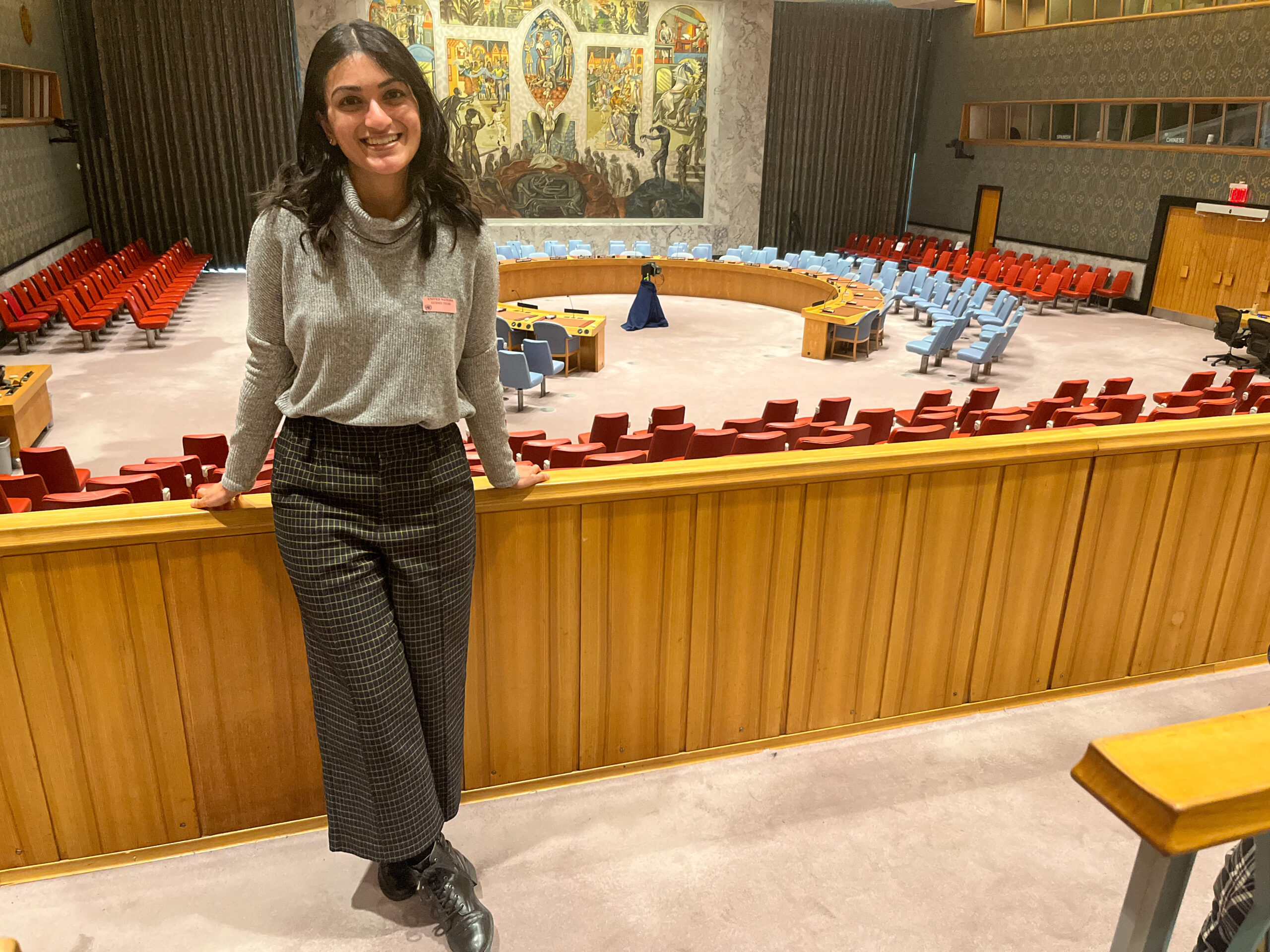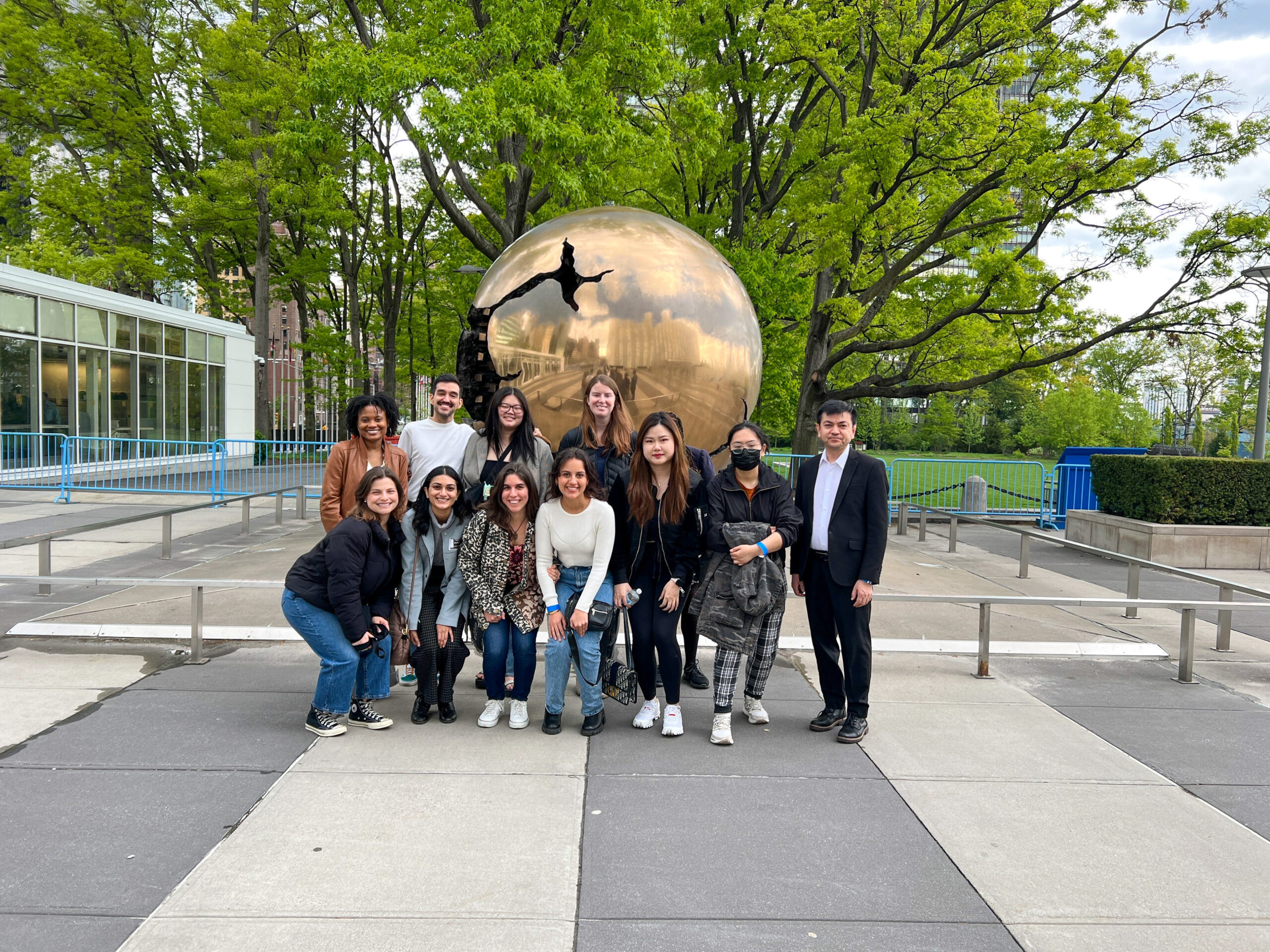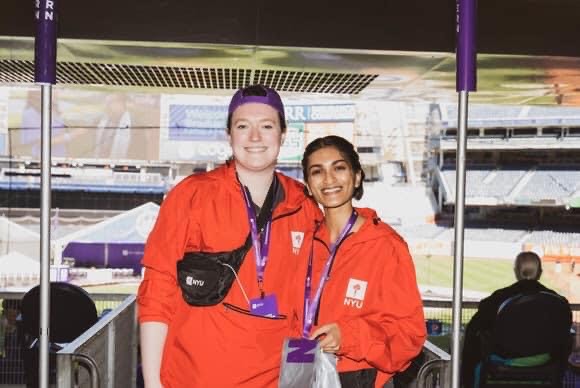
When considering graduate school, many feel they have to choose between working or attending classes. However, there is a way to do both and earn a fully funded graduate degree. Working full-time at a college or university can provide incredible benefits, including tuition remission (free tuition) for a Master’s degree or Ph.D. This option allows you to earn an income and pursue a fully funded Master’s or PhD!
Recently, we spoke with Nisha Shankar, an employee at the New York University (NYU) Stern Office of Career Development, who is using her tuition remission benefits to pursue a fully funded Master’s in International and Comparative Education. In her interview, Nisha shares why she applied for a job at NYU Stern and the benefits and challenges of pursuing a Master’s degree part-time while working full-time.
Tell us about your background and professional journey. What led you to pursue a Master’s in International and Comparative Education at NYU?
Growing up in a diverse town in New Jersey and being Indian-American, I have always been interested in learning about different cultures, languages, and religions. I minored in international studies at my undergraduate institution to explore career options that could help me learn about people different from me. Simultaneously, throughout college, I was involved in peer mentorship and leadership opportunities, and I liked empowering other students to find their passion and purpose. I realized that higher education was a career path I could pursue, and a year after I graduated, I was lucky enough to move from my job at a wealth management practice to working for my old mentor in leadership development at my alma mater, Rutgers University. I was there for six months until I was let go because of the pandemic. After reflecting on my career aspirations, I realized how much I loved my job at Rutgers and how I wanted to continue working in education, which led me to NYU.
Working at two globally focused, diverse universities exposed me to many international education opportunities. I was very excited when I saw that NYU had a program dedicated to that work. I work with a lot of international students in my job, and I felt that this program would not only enable me to better support them, but it would also prepare me well for anything I wanted to do in the future related to my interests in nonprofit management, foreign policy, and cultural exchange.

How did you get your job at the NYU Stern Career Office?
I was working at Rutgers when the pandemic hit, and due to a hiring freeze, they could not extend my contract. After that, I was unemployed for 13 months, which was very stressful. During that period, I was applying to jobs in every field that seemed remotely interesting to me: higher education, publishing, state government, nonprofits, think tanks, and media companies.
I was intentional about only applying to service- and mission-driven roles because that was important for my values. I got a couple of short-term remote internship positions at nonprofits, which were great learning experiences and gave me something interesting to talk about in interviews. However, NYU Stern was my top choice for full-time employment. I went to business school, my dad has two advanced degrees from Stern, and I also wanted to move to NYC, so I thought it would be a great fit.
I applied to many positions at NYU, including a few at Stern, but I did not get any of them. However, the NY Stern HR team was supportive and kept circulating my application materials to other hiring teams. I credit them for helping me land this position because I interviewed for 4 or 5 roles at Stern over the course of a year, without ever applying to any after the first one, before finally landing the job at the Office of Career Development.
The timing seemed to magically align as well because I started in a Coordinator position, which I might not have applied to given the level of experience it asked for, but due to the pandemic the school and I were willing to take more risks. At the time, my team and many others were in a period of transition. Shortly after joining NYU, a position opened up at the Associate Director level. Typically, I may have needed to remain in my Coordinator Position for a few years before I would be eligible for it. However, I was able to interview for the role and get promoted after only 10 months in my first position. While that period of unemployment was difficult financially and emotionally, it all worked out in the end!
How did you apply for your master’s program as an NYU employee? Was it different from applying as a student?
For the most part, the application process was the same as if anyone else was applying to the program; I just had to check off a box on my application stating that I was an employee. I benefitted from working in an office where almost everyone has taken advantage of the tuition remission benefit because NYU sincerely encourages its employees to use it. In addition, a few of my coworkers, who have become mentors, edited my essays and wrote my letters of recommendation. I also watched other coworkers apply for part-time master’s programs and get in, which made me less anxious about my chances. My knowledge of NYU’s programs and resources related to diversity and international education also helped. My program options were limited because I had to find something part-time. However, I found three different programs I was interested in and applied to all of them to increase my chances of getting in (I ended up getting into all three!). Another benefit of being an employee is that I did not have to pay any application fees, which made the process less nerve-wracking. I had the security of a full-time job and could apply again the following year if things didn’t work out.
How were you able to achieve your full tuition waiver?
NYU makes it very easy to receive tuition remission, but the process needs to be completed every semester. As long as the program is not a specialty program like law, medicine, or dentistry, employees only have to pay the taxes on tuition, which gets automatically taken out of our paychecks every month. However, to qualify for free tuition, employees must complete an online form called the Statement of Job Relatedness. In it, you make the case for why your courses that semester will teach you the necessary skills for your current job. If your petitions get approved, the term bill is updated to show that you essentially get a scholarship that covers the entire cost of tuition. It does take some finagling with various bureaucratic offices, but so far, I have been able to make the case for job-relatedness every semester.

How do you manage part-time graduate studies with a full-time job?
Throughout my undergraduate studies, I worked multiple part-time jobs while studying full-time, so I thought this would be similar. However, working full-time and studying part-time is significantly more difficult, especially in graduate school, because there is less flexibility with deadlines and scheduling meetings. There have been periods when I was incredibly busy at work, often staying at the office until 9 or 10 pm for events my team was running. Simultaneously, I had to navigate meetings for group projects and study for exams.
My cohort is small, and I was the only part-time student in the fall (this semester there is one more!), so it was hard to get my classmates to understand that I couldn’t just drop everything for a project meeting or club event. I joined the student event-programming board because I knew it would be hard to make friends as a part-time student, and I wanted to be involved in my school community. I am lucky to have a supportive work team who understands the struggles of going to school part-time, so I have learned how to ask for time off and switch responsibilities with teammates when needed. I have also had to resign myself to the fact that I cannot always study with my classmates or go to every event, so I have to participate a lot more in class and at the events I attend to ensure my presence and that I am part of the community.
What are the benefits of working full-time while going to school?
A huge benefit of working while going to school is that I can immediately put theories from class into practice working with international MBA students. I can also bring my professional encounters with students into the classroom. Before starting this program, I was nervous that my perspective would not be as valuable as those of students who come from all over the world (my program is 80% international students), but working at NYU has enabled me to have unique insights into our class discussions about being future international education professionals.

What advice do you have for others who want to pursue a master’s degree while working full-time?
Doing a master’s program part-time while working full-time is not easy and is not for everyone. However, it is possible, and it gets easier with practice. You have to be very self-aware about managing your priorities and time. For example, I make sure all my professors know that I am a part-time student and need to know about critical deadlines in advance so I can stay on top of my school and work projects without burning out.
I am a very introverted and quiet person. Out of necessity, I have had to become comfortable asking for help from my colleagues and classmates, delegating more, and being upfront when my plate is too full to take on additional responsibilities. I still struggle with saying no when asked to do things, whether by my manager, club advisor, professors, or classmates. However, I have learned that sometimes saying no makes you more responsible and considerate than saying yes.
Finally, if you are considering pursuing a full-time master’s program, I highly recommend getting a job at the university first. It’s very helpful to have a support system, both at work and home, that will prevent you from feeling like you have to navigate everything by yourself. You will get incredible benefits like tuition remission (and a very short commute!), and everyone you work with will be genuinely excited for you to learn new skills and pursue your aspirations.

© 2023 ProFellow, LLC, all rights reserved